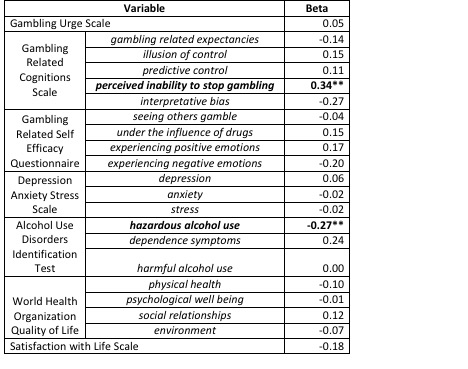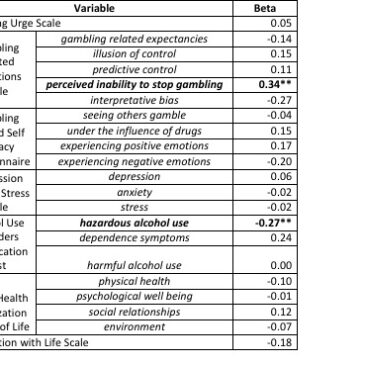During treatment for gambling problems, it is common for a counselor to encourage the client to change his or her thoughts and feelings about gambling. However, most of the research about the role of gambling thoughts and feelings comes from community samples, not clinical samples. Therefore, understanding how these and other factors predict problem gambling severity among clinical populations might be useful in developing effective treatment options. This week, The WAGER reviews a study by Tian Po Oei and Namrata Raylu, which examined how cognitive and psychosocial variables, including alcohol use/misuse, relate to gambling problems in a clinical population.
What was the research question?
What cognitive and psychosocial factors predict gambling problem severity in clinical populations?
What did the researchers do?
Using ads, media announcements, and referrals from a gambling hotline, researchers recruited 139 individuals to participate in a gambling treatment study. All participants completed a set of assessments that included the CPGI (Canadian Problem Gambling Index), the AUDIT (Alcohol Use Disorders Identification Test), and other measures of gambling-related cognitions, gambling urges, refusal self-efficacy (i.e., the ability to avoid gambling), life satisfaction, quality of life, and mental health. For the current study, the researchers examined pre-treatment data using multiple regression analyses to predict severity of gambling problems from these other measures.
What did they find?
Six of the seven measures were related to gambling problem severity. Individuals who reported more erroneous gambling cognitions, greater gambling urges, lower gambling self-efficacy, more issues with depression and anxiety, and lower quality of life and life satisfaction reported more gambling-related problems. Contrary to prior research, alcohol misuse did not relate to gambling problems. When the researchers looked at all of the measures at once in a single model, only two measures continued to show a relationship with gambling problems (see Figure). More specifically, people who reported feeling unable to stop gambling, and people who reported had low levels of hazardous drinking reported more severe gambling problems.

Figure. Multiple Regression Predicting CPGI Problem Gambling Severity Score. Note: ** indicates a statistically significant relationship. Click image to enlarge.
Why do these findings matter?
This study identified the specific factors that relate to severity of gambling problems among people who seek treatment. This is important because it can help treatment providers target cognitions and behaviors that are directly associated with problems in the populations they serve. The research suggests that individuals’ perceptions of their ability to control or stop their gambling might be an important target for treatment.
Every study has limitations. What were the limitations in this study?
The participants in this study were all volunteers and self-motivated to a certain extent. It would be interesting to see if the findings replicate among other clinical populations, such as mandated inpatient treatment programs. Additionally, the study only looked at relationships between measures collected at the same time, so it can tell us whether variables are related but not whether one causes the other. Finally, because the study investigated gambling problems among people seeking treatment, everyone in the sample had some gambling problems. This might explain why so few variables related to number of gambling problems in the full model – the difference between someone with three problems and someone with five problems is likely not as great as the difference between someone with no problems and someone with two problems.
For more information:
If you or a loved one is struggling with gambling or drug problems, please visit our addiction resources page. For more information about substance abuse treatment, please visit the Substance Abuse and Mental Health Services Administration website.
–Anjali A. Talcherkar
What do you think? Please use the comment link below to provide feedback on this article.




